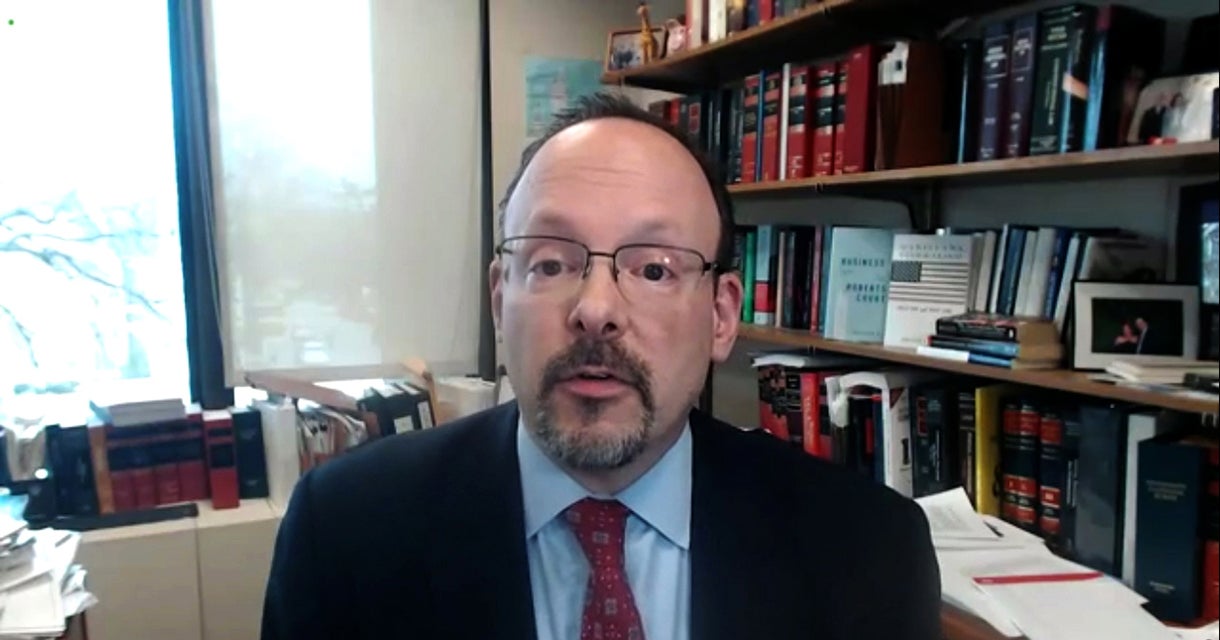features
An Independent Mind
Legal scholar Jonathan Adler pursues principles above politics and is a go-to expert for lawmakers, academics and the media
.jpg)
Law professor Jonathan Adler has earned a reputation for eagerly pursuing dialogue, debate and, if possible, common ground with those who disagree with him.
Testifying before a U.S. Senate Judiciary subcommittee by Zoom in March, Case Western Reserve professor Jonathan H. Adler disputed allegations that Supreme Court Justices were pursuing a right-wing, pro-corporate agenda.
"What's driving the justices is not fealty to a team, but their best efforts to get the answer right," Adler, JD, the Johan Verheij Memorial Professor of Law, told his audience.
He could have been talking about himself.
Typically described as conservative or libertarian, Adler has spent years trying to get things right—regardless of the politics. Weeks before he defended a conservative court before a Democrat-led Senate subcommittee, he argued before the world that former President Donald J. Trump could and should be impeached a second time.
Democratic impeachment managers from the U.S. House of Representatives cited Adler when they urged that Trump be impeached for inciting the Jan. 6 insurrection at the Capitol. Adler himself made the case on CNN, and his face was plastered across screens worldwide when he joined a bipartisan group of legal scholars who contended the Senate had the authority to try former officials.
That kind of media exposure is typical for Adler, who is a recognized authority on constitutional, administrative and environmental law and a highly visible public intellectual.
As a scholar, Adler has an uncommon gift for interpreting statutes, dissecting legal arguments and parsing judicial decisions.
 Jonathan Adler testifying before a U.S. Senate Judiciary subcommittee by Zoom in March.
Jonathan Adler testifying before a U.S. Senate Judiciary subcommittee by Zoom in March.
When not teaching or running the School of Law's Burke Center for Environmental Law, he usually can be found offering what he calls a "limited-government, free-market worldview" in blog posts, academic articles and book projects.
He also frequently appears in local, national and international media as a conservative legal expert expounding on a trending topic. In January alone, Adler was quoted more than two dozen times by news outlets from National Public Radio to The New York Times on everything from the Capitol riot to President Joseph R. Biden's environmental policies.
"His name is in the paper almost every day," said Jessie Hill, JD, the law school's Judge Ben C. Green Professor of Law and associate dean for research and faculty development. (Hill—who considers Adler a good friend—often appears with him on panels and in the media: "He’s the reasonable conservative, and I’m the reasonable liberal," she said.)
Despite his prominence as a right-leaning thinker and media pundit, however, Adler has earned a reputation among colleagues across the political spectrum for pursuing principle above politics; refusing to bow to pressure or conventional thinking from any direction; and eagerly pursuing dialogue, debate and, if possible, common ground with those who disagree with him.
He’s a conservative who helped co-found Checks & Balances, a group of attorneys who consistently castigated Trump for abusing his office and violating the Constitution. And he's a libertarian who supports government intervention on climate change.
"He's important as an example of intellectual integrity," said Daniel Farber, JD, a professor at the University of California, Berkeley School of Law who represents the liberal opposite to Adler's libertarian stance on environmental policy. "We need models like that in the academy—and elsewhere."
Nothing if Not Nuanced
That integrity was on full display during Adler's highly public engagement with the Affordable Care Act (ACA), popularly known as Obamacare and created to make health insurance more widely available.
Not long after Congress passed the ACA in 2010, Adler enraged liberals by laying the legal foundation for a challenge to the law that went all the way to the U.S. Supreme Court (King v. Burwell) in 2015. It didn't prevail.
Several years later, however, Adler denounced the legal basis of yet another challenge to Obamacare as "bananas" and joined a bipartisan group of legal scholars in filing a friend-of-the-court brief with the Supreme Court. Among his co-authors was Abbe Gluck, JD, a Yale University law professor who argued against Adler's reasoning in Burwell and now serves in the Biden administration.
—Jessica Berg, co-dean of CWRU’s School of Law
In both cases, Adler followed his analysis of the underlying statute, his understanding of the Constitution and his knowledge of settled law—even if, in the second case, that meant joining a former legal adversary in defending a piece of legislation under which he had previously built a fire.
"Jonathan is nothing if not nuanced," said Kristin Hickman, JD, a professor at the University of Minnesota Law School who has known Adler since the two clerked for the same federal judge 20 years ago.
Adler also draws a hard line between his work as a scholar and pundit and his role as a teacher, which involves training his students to "think like lawyers" rather than persuading them to share his views.
Just a day after his image was televised during the February impeachment proceedings in the Senate, for example, Adler could be found on Zoom introducing 130 first-year law students to the kind of fine linguistic distinction upon which many a lawsuit has hinged.
"So," Adler asked his remote class, "is the Snuggie blanket because it can be used as a blanket, or a garment because it has sleeves?"
A slide appeared onscreen of a woman ensconced in a Snuggie, a wearable blanket with sleeves and one-time pop-culture favorite. The students chuckled, but Adler was making a serious point: In law, words matter. As he explained, garments are subject to higher tariffs than blankets—which is why the company that imports the Snuggie from China sued the government for classifying it as a garment.
Like the rest of his lecture, it was funny, insightful and free from even the faintest hint of ideological bias.
Yet a review of the available evidence gives little indication that Adler would have become known as someone who scrupulously avoids imposing his opinions on others—much less someone who, in our highly polarized era, seeks to bridge what often appears to be a gaping chasm between opposing political camps.
Just the opposite: Earlier in his career, Adler spent nearly 10 years doing what he calls "aggressive policy work" at a staunchly libertarian think tank in Washington, D.C.
So how exactly did he get where he is today?
"Accidents," he said. "Lots and lots of them."
Free Market Environmentalist
Adler traces his roots as an environmentalist to his childhood in Philadelphia. He attended an experimental school that allowed him to spend one day a week on a farm, and he camped, fished and hunted on family trips to New Hampshire.
"I wanted to be an oceanographer or a zoologist," he said. (In more recent years, Adler has regularly taken his wife, Christina, and their two daughters hiking in Montana, where he is a senior fellow at a libertarian environmental think tank.)
 Image: Courtesy of Jonathan Adler
Image: Courtesy of Jonathan Adler
Because he works with a think tank in Montana, Jonathan Adler takes family trips to the state, hiking in national parks and forests with his wife, Christina, and their daughters,
Madeline (pictured), now in middle school, and Ellen, a CWRU nursing student.
As an undergraduate at Yale, Adler developed an interest in conservative political philosophy that seemed at odds with his nascent environmentalism. But then a summer internship at the Cato Institute showed him that there were at least some libertarians interested in environmental policy. Soon afterward, a friend recommended him for a job at another libertarian policy shop in Washington, the Competitive Enterprise Institute (CEI).
"Well, D.C. is fun," Adler remembers thinking. "Maybe I'll try it."
As director of CEI's environmental studies program, Adler wrote hundreds of op-eds and grew adept at digesting academic studies for the press and the general public—skills he still applies as an educator and media commentator.
Yet the tribal nature of D.C. eventually became intellectually constraining. "I wanted to engage with nuance that the red team-blue team stuff didn’t allow or acknowledge," he recalled.
Night classes at George Mason University School of Law led to a clerkship with a judge on the U.S. Court of Appeals, and, in 2001, Adler joined the faculty at Case Western Reserve.
Interested in Intersections
Adler brought to campus the media savvy and connections he acquired at CEI that have helped keep him in the public eye.
He also brought the reputational baggage that came from his former environmental positions, which included downplaying the significance of global warming.
"I look back on some of it and I shudder a little bit," said Adler, who has since embraced the idea of a government-imposed carbon tax and suggested market-based incentives to encourage development of alternative energy sources.
Still, he said, "you can't un-ring that bell."
It was certainly still ringing for Andre Monette, JD (LAW '06), when he came to the law school in 2003.
A committed environmentalist, Monette—now managing partner of Best Best & Krieger LLP's Washington, D.C. office, where he works in the firm's Environment and Natural Resources practice—arrived expecting Adler to promote big business at the expense of the environment.
Instead, he found a teacher dedicated to helping his students understand the legal framework surrounding complex issues so they could, as Adler said, become "the best environmental lawyer of the sort that they want to be."
"He really opened my mind," Monette said.
He has that effect on a lot of people.
On one hand, said Farber, Adler’s ideological bona fides help him reach conservatives and libertarians who might not otherwise care about environmental issues.
On the other, said Hickman, he brings intellectual diversity to a legal academy that tends to skew liberal and progressive.
His outlier status and legal erudition have made Adler unusually influential.
"He's one of the most-cited legal scholars in the country," said Jessica Berg, JD, co-dean at the law school and the Tom J.E. and Bette Lou Walker Professor of Law.
And by providing a minority view within the academy on matters ranging from health care policy to the Endangered Species Act, his colleagues say, Adler has improved the quality of legal scholarship at large.
"We all benefit from having people with different viewpoints challenge our preconceived notions," Hickman said.
Adler obviously agrees.
His approach as director of the Burke Center has been determinedly ecumenical. For the center's inaugural symposium in 2019, Adler invited then-U.S. Environmental Protection Agency chief Andrew Wheeler, JD (WRC '87), along with former agency officials from the Obama, Clinton and both Bush administrations. Now that the Biden administration is making climate change a priority, Adler is co-sponsoring a series of programs to explore how libertarian and conservative political theory can address the problem.
"I'm interested in creating intersections that we might not otherwise get," Adler said, adding that his own heterodox perspective opens up opportunities for research and dialogue that may not exist elsewhere.
He's talking about the center. But at this point, it's pretty much the story of his life.





